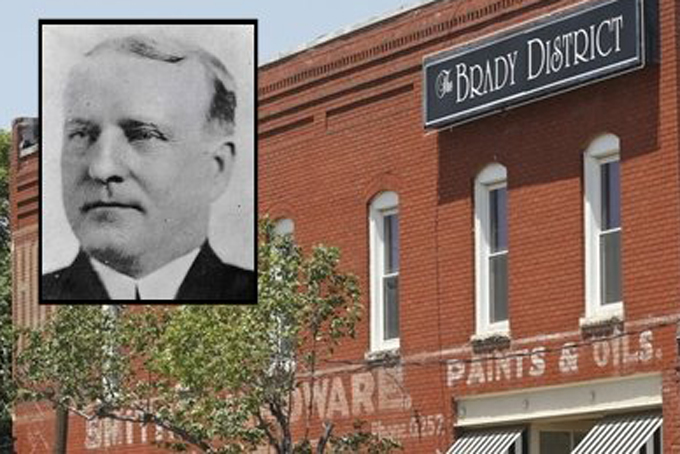
by Jeffrey Myers
WTB. The nearly-faded initials engraved on the gold pocket watch belong to one of the founders of Tulsa, Oklahoma. When Wyatt Tate Brady arrived in 1890, Tulsa had but a few hundred residents, all drawn by seemingly boundless opportunity. The pioneer Brady rolled up his sleeves and went to work, helping turn an untidy tangle of dirt streets and a handful of tents into what would one day be referred to as the “oil capital of the world”. Tate Brady was a hotel owner and an entrepreneur, a successful businessman and a civic leader. He was also my great-grandfather.
KKK. The initials require little explanation. Neither do the all-white robes and sharply pointed hats of the Ku Klux Klan, which call forth images of lynchings by day and cross burnings by night. For many KKK members, intimidation and acts of terror were considered to be an acceptable means to achieving a sinister end — White supremacy. By 1920, some four million Americans were members of the Ku Klux Klan. My great-grandfather was one of them.
Shock and shame, disbelief and defensiveness. An array of emotions swept over the descendants and admirers of Tate Brady — the larger-than-life pioneer and patriarch, the visionary and founding member of a local church, as details of his involvement with racist groups emerged.
In some ways, Tate Brady can be said to have been a child of his times. He was a member of the Sons of Confederate Veterans in a young city painfully divided along racial lines. He was a man filled with larger-than-life dreams, as well as inconsistencies. Having joined the Ku Klux Klan as a young man, he later renounced the group, going on to support an anti-Klan gubernatorial candidate for election.
As revelations of membership in racist organizations and possible complicity in the infamous Tulsa Race Riot of 1921 came to light, the City of Tulsa decided to rename the street bearing the name of my great-grandfather. Brady Street became M. Brady Street, a tribute to the Civil War photographer Mathew Brady. Amidst criticism of historical revisionism (Mathew Brady had no direct relationship to Tulsa), the name change was intended as a sign of good will and reconciliation.
But the larger question remains as to whether this is mere cosmetic change. Will the “sins of the fathers”, the failures and cruelties of the past, remain – at least this side of heaven – unredeemed? Will past injustices – “man´s inhumanity to man” – have the final say?
As providence would have it, Brady Street is intersected by Martin Luther King, Jr. Boulevard. The debate that raged over the name change took place, coincidentally, in August of this year – the same time the nation was commemorating King´s historic March on Washington 50 years ago. Dr. King´s vision has lost nothing of its power: “Now is the time to rise from the dark and desolate valley of segregation to the sunlit path of racial justice. Now is the time to lift our nation from the quicksands of racial injustice to the solid rock of brotherhood.”
Though critical of the name change as an attempt to whitewash parts of history we would rather not see, I nevertheless ask myself, as other family members do, what our part might be in encouraging reconciliation. Along the way one has to be careful, of course, not to commit “the greatest treason” which, in the words of the poet T. S. Eliot, lies in doing “the right deed for the wrong reason.”
But there is surely a place – even years after injustices have incurred, including ones for which we bear no direct responsibility – to write a letter or make a phone call, to start a conversation or write a check. And we do so not only to help redeem the past in some small way, but perhaps in the hope that one day our own great-grandchildren and the coming generations might continue the work of reconciliation for the injustices committed, knowingly and unknowingly, by our own generation.
As with many families with roots in the South, the song “Will the Circle Be Unbroken” remains a family favorite. It was written in 1907 – the same year Oklahoma became a state and Tate Brady was named to the Democratic National Committee. This gospel hymn sings of that which joins us together and holds us through the night, even when the circle is threatened by disappointment or grief, scandal or failure. It speaks of love which is stronger than hate, stronger even than death itself.
May the circle be unbroken.
Dr. Jeffrey Myers
Frankfurt am Main
GERMANY
